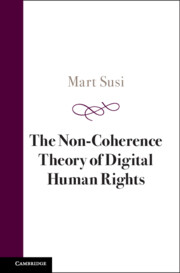Book contents
- The Non-coherence Theory of Digital Human Rights
- The Non-coherence Theory of Digital Human Rights
- Copyright page
- Contents
- Acknowledgements
- Introduction
- Part I The Contextual Challenges and Purpose of the Non-coherence Theory of Digital Human Rights
- 1 Horizontal and Vertical Governance Models and Normativity
- 2 The Ontological Dimension
- 3 The Epistemic Dimension
- 4 On the Controversy about the Relative Weight of Rights
- 5 Constitutional Entitlements to Human Rights in the Digital Domain
- Part II Reflections on Some Theories and Doctrines
- Part III The Core Elements of Non-coherence Theory
- Part IV The Impact of the Non-coherence Theory
- Part V Internet Balancing Formula
- In Lieu of the Concluding Remarks
- Index
2 - The Ontological Dimension
Reflections on Distorted Images and Normative Fragmentation
from Part I - The Contextual Challenges and Purpose of the Non-coherence Theory of Digital Human Rights
Published online by Cambridge University Press: 22 February 2024
- The Non-coherence Theory of Digital Human Rights
- The Non-coherence Theory of Digital Human Rights
- Copyright page
- Contents
- Acknowledgements
- Introduction
- Part I The Contextual Challenges and Purpose of the Non-coherence Theory of Digital Human Rights
- 1 Horizontal and Vertical Governance Models and Normativity
- 2 The Ontological Dimension
- 3 The Epistemic Dimension
- 4 On the Controversy about the Relative Weight of Rights
- 5 Constitutional Entitlements to Human Rights in the Digital Domain
- Part II Reflections on Some Theories and Doctrines
- Part III The Core Elements of Non-coherence Theory
- Part IV The Impact of the Non-coherence Theory
- Part V Internet Balancing Formula
- In Lieu of the Concluding Remarks
- Index
Summary
The ontological dimension of human rights in the digital domain concerns its theoretical foundations and the content of human rights norms. Based on the Aristotelian theory of epistemology, this represents the side of objective reality. The non-coherence theory of digital human rights explores the ontology of human rights at various levels of generality. Eight justification models articulated for the human rights offline domain will be applied to digital human rights. If the implicitness of human rights online were to originate from this same online domain, it could no longer be viewed through non-coherence theory, as it would represent an entirely independent and separate paradigm of meanings. Since the online world is determined by technical possibilities, we can formulate a hypothesis that the gap between the implicit and explicit dimensions of human rights online are by default narrowing since these elements of implicitness, which cannot be realised online, are simply rejected.
Keywords
- Type
- Chapter
- Information
- The Non-Coherence Theory of Digital Human Rights , pp. 20 - 39Publisher: Cambridge University PressPrint publication year: 2024

